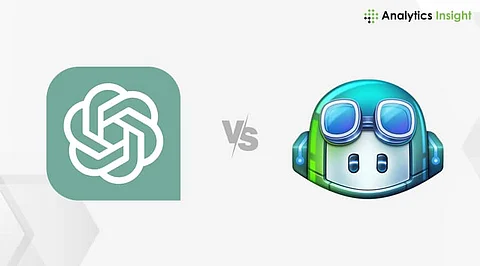

Two well-known AI tools are GitHub Copilot and ChatGPT. GitHub Copilot is an AI-powered coding helper by Microsoft designed to help developers write code more quickly. Conversely, OpenAI's AI chatbot ChatGPT does a great job of producing language that appears human based on the input it gets. Each tool has its distinct advantages and makes use of cutting-edge AI technologies. Which is the greatest, though? The purpose of this comparison is to examine the features of ChatGPT and GitHub Copilot and offer insights to assist you in selecting the solution that best meets your needs.
GitHub Copilot is an AI-powered code completion tool that helps developers by recommending lines or blocks of code as they type. It was created by GitHub and OpenAI. It is a smooth and seamless element of the coding process since it is immediately incorporated into the incorporated Development Environment (IDE). Copilot is made to comprehend the context of the code being written and modify its recommendations based on the coding style and project specifications of the user.
The tool is very helpful for accelerating the coding process, especially when it comes to repetitive jobs. It may also be a great learning tool for new programming languages and frameworks. Though GitHub Copilot can produce code rapidly, it's crucial to remember that the recommendations it makes might not always be the best or most effective, so developers should thoroughly check the code.
OpenAI-developed conversational AI model, ChatGPT, can produce text that appears human-like in response to suggestions. Because it has been educated on a wide variety of online literature, it can handle a wide range of subjects and discussions, including help with coding. ChatGPT can offer solutions to coding issues, explain difficult code, and make improvement suggestions. It also can produce code snippets in answer to certain queries.
ChatGPT offers a wider variety of features and is not limited to an IDE like GitHub Copilot. It can help with ideation, problem-solving, and even content creation that isn't code-related. Although this makes ChatGPT a more flexible tool, it might not offer as many code-specific recommendations as GitHub Copilot.
Integration: real-time code recommendations are provided by GitHub Copilot, which is integrated into the IDE. ChatGPT provides more comprehensive support and functions independently of the IDE.
Objective: ChatGPT may help with a range of jobs, including but not limited to coding, whereas Copilot is particularly for coding.
Training: ChatGPT is trained on a vast array of online text, whereas Copilot is trained on a sizable corpus of publicly accessible code.
Use Case: ChatGPT is great at explaining things and having longer talks, while Copilot is better at code completion and suggestions.
GitHub Copilot and ChatGPT can be chosen based on the user's needs. GitHub Copilot should be used if the main need is help with coding inside of an IDE. ChatGPT is better suited for a wider range of tasks, such as content generation and conversational engagement.
In conclusion, strong AI tools like ChatGPT and GitHub Copilot both boost output and innovation in their specialized fields. The "best" instrument is a matter of opinion and depends on the situation. It is recommended that content producers and developers investigate both technologies to see which best suits their goals and processes. The distinctions between conversational AI and coding help may become increasingly hazy as AI technology develops and both tools' capabilities increase.
Join our WhatsApp Channel to get the latest news, exclusives and videos on WhatsApp
_____________
Disclaimer: Analytics Insight does not provide financial advice or guidance. Also note that the cryptocurrencies mentioned/listed on the website could potentially be scams, i.e. designed to induce you to invest financial resources that may be lost forever and not be recoverable once investments are made. You are responsible for conducting your own research (DYOR) before making any investments. Read more here.
